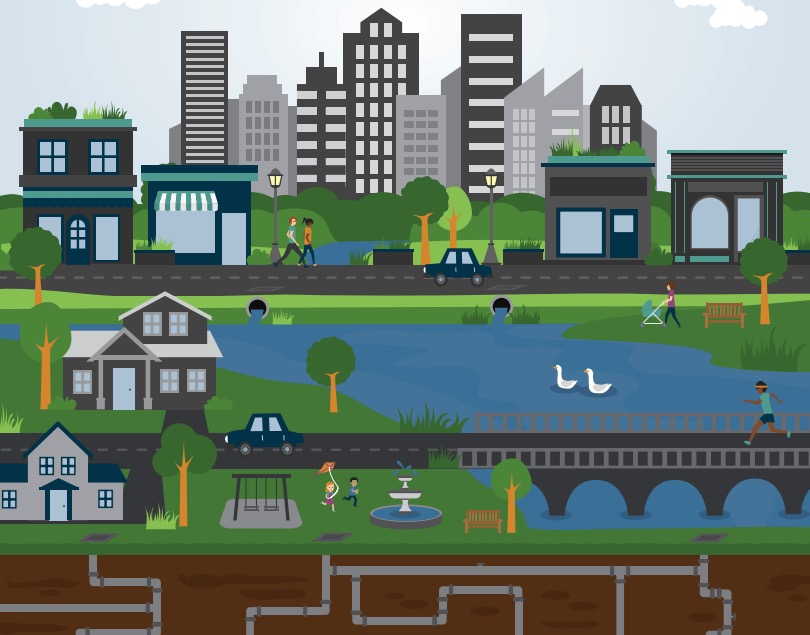JERSEY WATER WORKS (JWW)
Executive Summary
 Water Infrastructure is invisible. People and businesses expect the ready availability of clean, affordable drinking water, safe removal of wastewater and efficient management of stormwater. But when water infrastructure fails — whether through a water or sewer main break, local flooding or pollution swept into a fishing stream — its impact becomes all too obvious.
Water Infrastructure is invisible. People and businesses expect the ready availability of clean, affordable drinking water, safe removal of wastewater and efficient management of stormwater. But when water infrastructure fails — whether through a water or sewer main break, local flooding or pollution swept into a fishing stream — its impact becomes all too obvious.
This report reveals the alarming condition of New Jersey’s water infrastructure and highlights the cross-sector collaboration led by Jersey Water Works to ensure healthy, sustainable communities. The water infrastructure problem is too big for any one organization to tackle alone. Century-old water pipelines are weak and obsolete, and dysfunctional systems combine raw sewage and rainwater after storms and discharge both into local rivers. Multiple individuals, agencies, companies and towns share the cost and responsibility. Managing these assets — planning ahead to maintain, upgrade and replace them — is expensive, requires special expertise and presents an enormous leadership challenge.
Jersey Water Works was formed as a collaborative effort among stakeholders from all perspectives — from consumers and community advocates to utility leaders and policymakers, to environmentalists and academics — to identify concrete solutions to improve New Jersey’s water infrastructure and promote vigorous economies, healthy environments and excellent quality of life. An active steering committee of 25 representative thought leaders, five hard-working committees focused on measurable objectives, and a network of more than 350 members who champion shared goals have together produced the framework detailed in the following pages.
This “action agenda” provides clarity on how Jersey Water Works has brought so many stakeholders together to effect change, offers an in-depth understanding of the state’s water infrastructure and the context for improvement, and outlines Jersey Water Works’ consensus on practical solutions.
To move New Jersey’s water systems forward into the 21st century, the collaborative launched a strategic planning process to identify major systemic obstacles and to develop priority solutions to overcome them. Multi-sector working committees supported by staff from New Jersey Future considered the possibilities based on local and national research. The two most significant obstacles were determined to be the lack of adequate financing and the lack of robust asset management. (See “Jersey Water Works: A New Kind of Change Agent” on p. 9.)
In order to achieve better outcomes in New Jersey and across the nation, Howard Neukrug and Diana Lind of the University of Pennsylvania argue that we must rethink how we manage, fund, design and rebuild our water systems. Their essay, which forms the middle section of this report, lays out a broad set of options that can move communities to a sustainable water future, such as realizing the enormous cost savings from repairing leaks that forfeit millions of gallons.
They also feature successful New Jersey examples such as recovering methane energy from wastewater and using rain gardens to mitigate flooding. (See “Transforming New Jersey’s Water Infrastructure: A Call to Action and Innovation” on p. 15.)
“Our cities and states need a new roadmap to ensure water sustainability and community resiliency—to provide modern, reliable water services to all, to restore our waterfronts and waterways, and to keep our communities healthy and safe.” — Howard Neukrug, Professor of Practice, Earth & Environmental Science, University of Pennsylvania
Three priority solutions emerged from Jersey Water Works’ comprehensive strategic planning process. Each one will require all stakeholders to work together to press for solutions and build public will. (See “Jersey Water Works: Solutions That Form Our Action Agenda” on p. 33 for more details.)
- Robust asset management to enable water utilities to deliver the optimum level of service with the most community benefits at the lowest lifecycle cost.
- Educated stakeholders so that ratepayers and rate setters, consumers and policymakers can understand the value of investing in water infrastructure and the peril of deferring maintenance.
- Government funding initiatives to provide loans and grants to help implement asset management and upgrade systems.
Timing has never been better to address asset management. With the 2017 New Jersey Water Quality Accountability Act, the state has the potential to become one of the leaders in requiring drinking water systems to fund and implement asset management best practices. Jersey Water Works members will work together to develop recommendations for needed regulations to implement the law. Innovative thinking will help ensure that rules go beyond requiring reporting to state agencies, and ensure transparency so that consumers know how well their water system performs, and whether it is getting better or getting worse.
Responsibility for transforming New Jersey’s water systems falls to us all. The Jersey Water Works collaborative engages people from an array of viewpoints, including policymakers, public and private utilities executives, community advocates, engineers and environmentalists. This report provides us with the latest innovations in water infrastructure and a strategic focus on priority solutions that, by guiding the efforts of the collaborative and of individual organizations, can ensure our continued progress.
About Jersey Water Works (JWW)
www.jerseywaterworks.org
Jersey Water Works is a collaborative effort of many diverse organizations and individuals who embrace the common purpose of transforming New Jersey’s inadequate water infrastructure by investing in sustainable, cost-effective solutions that provide communities with clean water and waterways; healthier, safer neighborhoods; local jobs; flood and climate resilience; and economic growth.
Tags: Jersey Water Works, JWW, New Jersey, New Jersey's Water Infrastructure, NJ






 RSS Feed
RSS Feed